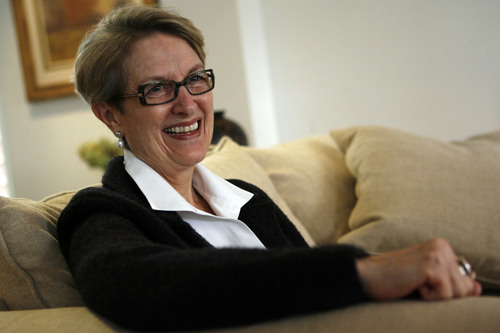This is an archived article that was published on sltrib.com in 2014, and information in the article may be outdated. It is provided only for personal research purposes and may not be reprinted.
Did you know that having access to preventative health care and being able to pay for the health care you need when you need it is almost a prerequisite for being able to keep a roof over your head? That's because becoming homeless is often the result of a chain of linked events that catch people off guard. It's all about chain reactions.
Here's how it goes. Imagine a man named Ned. He's a skilled carpenter working for a business that installs designer kitchens. His wife also works. Neither gets health care coverage from their employers, but between them, they make enough money to buy a basic, high deductible plan for their family. They have two children.
Ned gets colon cancer and has an operation and prolonged radiation and chemotherapy. In the middle of his treatment the policy ceases to pay his bills because Ned can't work and can no longer afford his monthly premiums. His choice is to die or go into bankruptcy. Not surprisingly, he chooses bankruptcy. In fact 62 percent of all bankruptcies in the U.S. were caused by health problems even though 78 percent of those people had health care insurance.
Ned's family loses their home. If they had had family to move in with, they would have been poor, but fine. Instead, they're living in their car, eating at The Road Home, and getting health care at the Fourth Street Clinic.
Nearly 50 percent of today's homeless are families. Such are the stories heard at the homeless shelter every day.
Homelessness is the extreme end of the linked chain I've mentioned. Losing a job or having to change a job and take a pay downgrade are more common links, but what comes next all begins with a health care failure. It might be selling a beloved house and moving into a neighborhood that's not so nice, where the schools aren't as good, and the children keep company that is worrying. Or maybe it's a story of losing a job to illness or injury, of the depression that comes when financial pressures build and pain increases, of the tragedy involving the misuse of medication that leads to addiction. These are all common stories affecting families every day.
Our health is the keystone to our families' security; those secure families together combine to provide for the economic security of the state. If parents aren't healthy, kids aren't healthy. If kids aren't healthy, teachers aren't able to reach them in the classroom. This chain of events causes the tax base to suffer and the social burden to grow. The absence of basic health care in our society lowers the general standard of living for the whole society.
Medicaid is all about making sure this keystone offer of health care is in place so that everybody has a chance to flourish. The very best we could do is accept full expansion of Medicaid so that everyone is covered and all of the taxes Utahns have sent to Washington come back to Utah and are spent healing Utah citizens. The Legislature has rejected that option.
Gov. Herbert's Healthy Utah Plan is the second best option. It covers almost as many Utahns and it works through the private sector. A recent poll revealed that 88 percent of Utahn's supported the Governor's Healthy Utah Plan over doing nothing, while a full 70 percent favored it outright. For the sake of the long term economic health of Utah and its citizens, it is time the Legislature listens and acts upon what it hears.
Karen Shepherd represented Utah's second district in the U.S. House of Representatives and now serves on the boards of Alliance for a Better UTAH and Fourth Street Clinic.



